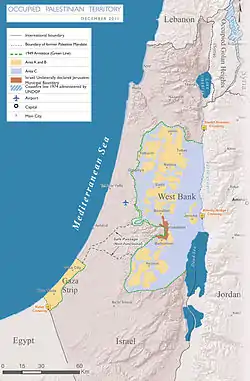| UN Security Council Resolution 1515 | ||
|---|---|---|
 | ||
| Date | 19 November 2003 | |
| Meeting no. | 4,862 | |
| Code | S/RES/1515 (Document) | |
| Subject | The situation in the Middle East, including the Palestinian question | |
Voting summary |
| |
| Result | Adopted | |
| Security Council composition | ||
Permanent members | ||
Non-permanent members | ||
| ||
United Nations Security Council resolution 1515, adopted unanimously on 19 November 2003, after recalling all previous resolutions on the situation in the Middle East, particularly resolutions 242 (1967), 338 (1973), 1397 (2002) and the Madrid Principles, the Council endorsed the Road map for peace proposed by the Middle East Quartet in an attempt to resolve the Israeli–Palestinian conflict.[1] The resolution, proposed by Russia, envisaged a Palestinian state by 2005 in return for security guarantees for Israel.[2]
The Security Council expressed concern at the continuing violence in the Middle East, reiterating its demand for an end to hostilities and all acts of terrorism, provocation, incitement and destruction.[3] It envisaged a solution whereby Israel and Palestine exist side by side within recognised borders and solutions to the Israeli–Lebanese and Israeli–Syrian situations.[4]
Welcoming international diplomatic efforts, the resolution called on all parties to fulfil their obligations under the Road map working in co-operation with the Quartet in order to achieve a two-state solution.
See also
References
- ↑ "Security Council adopts resolution endorsing road map leading towards two-state resolution of Israeli–Palestinian conflict". United Nations. 19 November 2003.
- ↑ Leopold, Evelyn (19 November 2003). "UN Council votes to endorse Mideast 'road map'". Reuters.
- ↑ Korobkin, Russell; Zasloff, Jonathan (2005). "Roadblocks to the Road Map: A Negotiation Theory Perspective on the Israeli–Palestinian Conflict After Yasser Arafat". Yale Journal of International Law. 30.
- ↑ Summers, James (2007). Peoples and international law: how nationalism and self-determination shape a contemporary law of nations. Martinus Nijhoff Publishers. p. 261. ISBN 978-90-04-15491-9.
External links
 Works related to United Nations Security Council Resolution 1515 at Wikisource
Works related to United Nations Security Council Resolution 1515 at Wikisource- Text of the Resolution at undocs.org